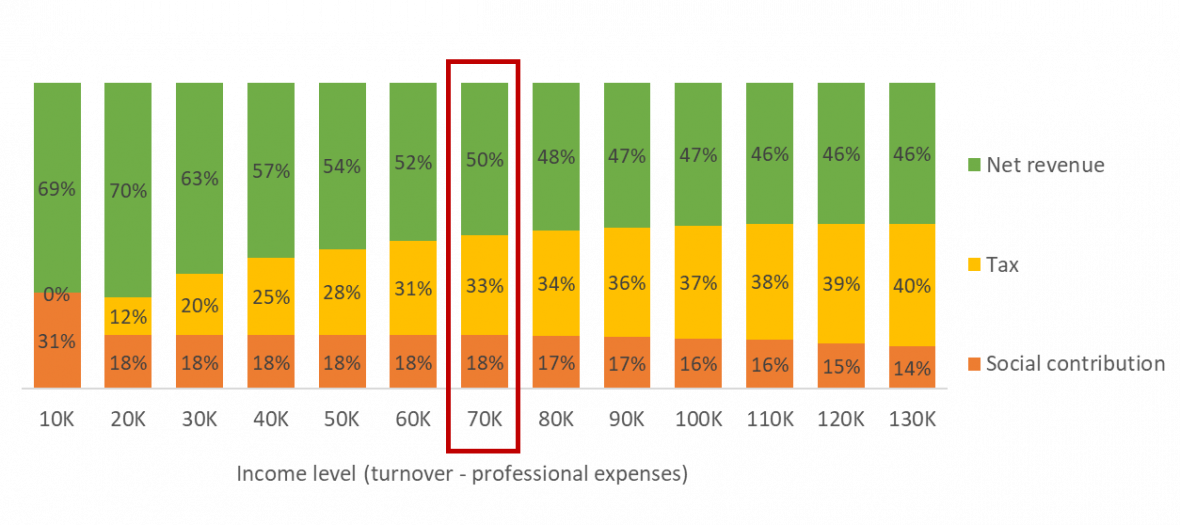Taxation on professional income in Belgium is one of the highest in Europe. As a self-employed person, choosing the right legal status and making wise choices based on your personal situation will allow you to maximize your net income.
In this article, we will detail the tax consequences of the activity of self-employed natural person activity. Then we will explain to you the levers that can be activated in order to optimize your tax situation, thanks to a management company.
1. Impact of taxation on professional income
As a self-employed person, your professional income is subject to two types of income tax:
- Social security contributions
They generally amount to 21% (20.5% + ~0.5% management fees) of net income.
- Taxes
The tax rate is progressive in stages, the rate therefore increases according to income. To this tax are added the municipal taxes which represent on average 8% of the amount of the tax.
We illustrate in the graph below the impact of taxation on the income of a self-employed person (assumptions: single, childless, municipal tax of 8%):
From €70,000, a self-employed person pays an overall amount of tax of more than 50%!

2. Ways for limited tax optimization as a self-employed person
If you are a self-employed natural person, the possibilities for tax optimization are limited, you can:
– consider the issue of copyright if you carry out original creative activities for your clients. If you meet all the conditions, this income is subject to a particularly advantageous tax regime with an effective rate of withholding tax of 7.5% (+ municipal tax) for the first bracket of income up to €17,090. Calculate your tax savings here using our simulator.
– optimize your deductible professional expenses: this reduces your tax base and therefore lowers the tax rate. VIP Conseil has written a full article on the subject.
3. Benefits of working through your company
If you create a management company through which you bill your clients, new levers can allow you to increase your net income.
- Smooth your professional income from one year to the next
Given the progressive nature of personal income tax, “good years” are taxed up to the maximum marginal rate of 54% (50% + additional municipal). If you alternate the “good” and the “worse” years, this represents a tax loss that is sometimes substantial compared to the taxation of an activity generating stable income.
Going through your company will allow you to smooth your taxable remuneration as a natural person. The remaining profit balance can be carried over to compensate for less financially difficult periods and to keep a stable taxable remuneration.
- The distribution of dividends to benefit from a reduced tax rate
Another possibility is to distribute dividends to shareholders (that is, to you in the case of a sole proprietorship!). Under certain conditions, these dividends may be subject to withholding tax reduced to 15% (instead of the normal rate of 30%).
The net-in-pocket for small business shareholders is 68%. Here is the detail of the calculation:
– €100 corporate taxable profit – €20 corporation tax = €80 distributable profit
– €80 – 15% withholding tax * €80 = €68 net out of pocket for the shareholder
- Group insurance (EIP), an interesting insurance product for a personal real estate project
The EIP (Individual Retirement Commitment) is a retirement savings formula for company directors. Each year, your company pays an amount of insurance based on your income. This amount is deductible for your business in the year of payment. It will be taxed when you retire at an advantageous tax rate (2nd pension pillar).
You can take advantage of this insurance to invest in personal real estate projects, thanks to a specific mechanism. And this, from the first year of payment.
- Other advantages
> Security: Protect your private assets. The company has its own legal personality. After the first 24 months of activity, the risk capital is limited to your initial contribution for the creation of the company. In the event of bankruptcy, your personal assets are therefore safe.
> Collaboration: Working together in a common legal structure with your partners can facilitate and formalize your collaboration. Presenting a common image can also be a plus at the commercial and marketing level.
> Easier access to bank financing: The credit capacity for companies is calculated in relation to EBITDA (i.e. the profit for the year before tax and amortization) while for individuals, this capacity is calculated on net income after tax. Obtaining a bank loan is therefore often easier in company.
- But also some disadvantages
We have just seen the benefits of starting a company as a self-employed person. However, some points need to be considered.
– There are more legal and administrative obligations. This requires more follow-up than as a self-employed natural person. In short, it takes discipline.
– More complex accounting: keeping double-entry accounting and the legal and tax obligations arising from a company will require you to call on an accountant.
– Some higher costs: count between €1,800 and €2,500 in costs related to setting up a company (notary, financial plan, ECB registration and VAT). Annually, you will have to pay a municipal tax (depending on the registered office of your company) as well as the annual contribution payable by companies (€347.50).
4. Last tip
In conclusion, if your turnover as a freelancer reaches between €70,000 and €80,000/year, it’s time to think about starting a company. And as each situation is different, we advise you to request a personalized simulation from an accountant such as our partner VIP Conseil.

Hadrienne Flahaux is CEO and founder of VIP Conseil, a Belgian accounting and tax firm specializing in supporting the self-employed. VIP Conseil offers you proactive advice to help you optimize your net income while sparing you administrative worries thanks to an innovative digital processing of your accounting.
 Back to posts
Back to posts


